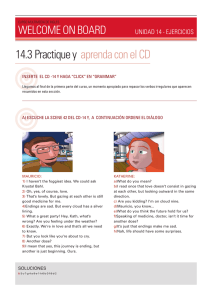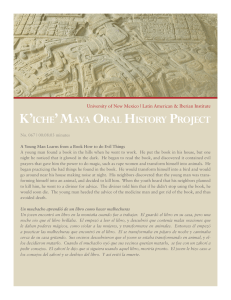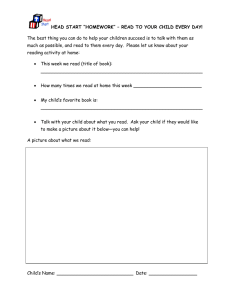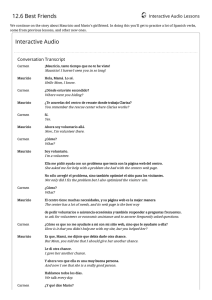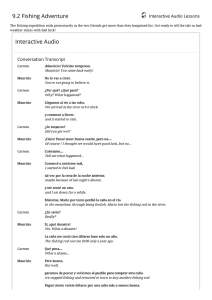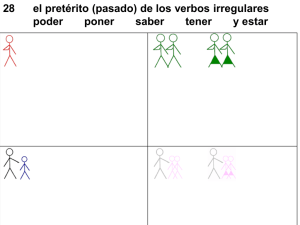9.3 Lost Book Interactive Audio
Anuncio
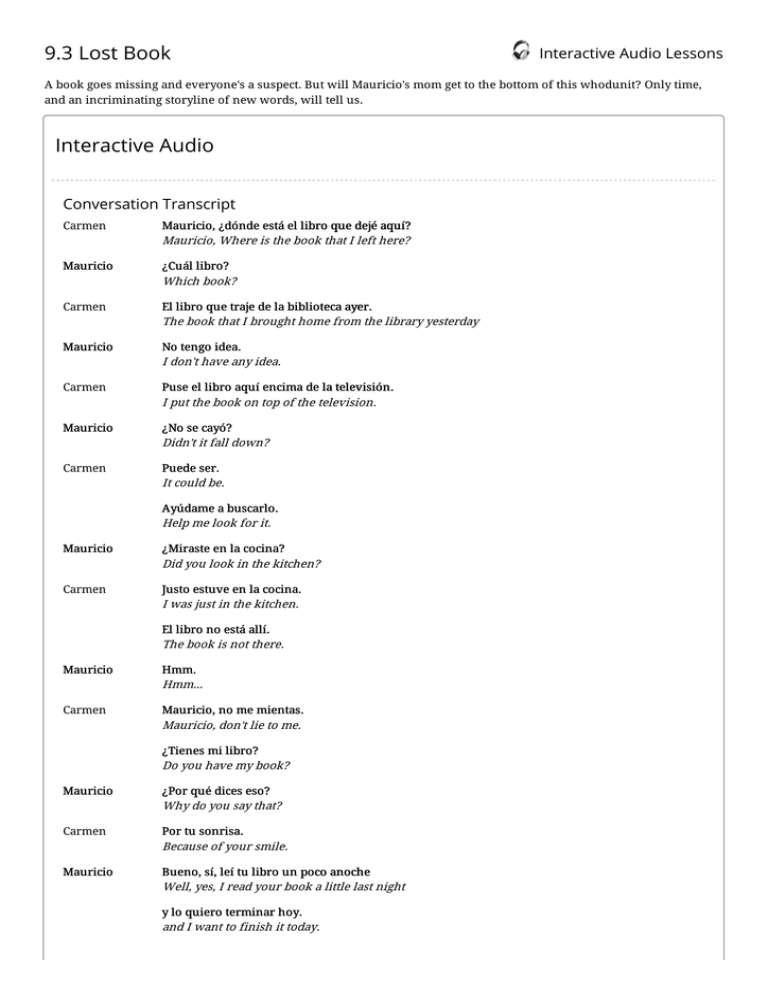
9.3 Lost Book Interactive Audio Lessons A book goes missing and everyone's a suspect. But will Mauricio's mom get to the bottom of this whodunit? Only time, and an incriminating storyline of new words, will tell us. Interactive Audio Conversation Transcript Carmen Mauricio, ¿dónde está el libro que dejé aquí? Mauricio, Where is the book that I left here? Mauricio ¿Cuál libro? Which book? Carmen El libro que traje de la biblioteca ayer. The book that I brought home from the library yesterday Mauricio No tengo idea. I don't have any idea. Carmen Puse el libro aquí encima de la televisión. I put the book on top of the television. Mauricio ¿No se cayó? Didn't it fall down? Carmen Puede ser. It could be. Ayúdame a buscarlo. Help me look for it. Mauricio ¿Miraste en la cocina? Did you look in the kitchen? Carmen Justo estuve en la cocina. I was just in the kitchen. El libro no está allí. The book is not there. Mauricio Hmm. Hmm... Carmen Mauricio, no me mientas. Mauricio, don't lie to me. ¿Tienes mi libro? Do you have my book? Mauricio ¿Por qué dices eso? Why do you say that? Carmen Por tu sonrisa. Because of your smile. Mauricio Bueno, sí, leí tu libro un poco anoche Well, yes, I read your book a little last night y lo quiero terminar hoy. and I want to finish it today. Carmen ¡Me lo escondiste! You hid it from me! Mauricio Perdón, mamá. Sorry, mom. Lo tuve que hacer. I had to do it. Extra Vocabulary Bienvenidos al Segundo Curso de Rocket Spanish, Lección 1.3: El Libro Perdido Welcome to the second course of Rocket Spanish, Lesson 1.3: The Lost Book. Dejé mi abrigo en el restaurante. I left my coat at the restaurant. Dejé las llaves en el carro. I left my keys in the car. Traer To bring Traje I brought Trajiste You brought Trajo He / She / It brought Trajimos We brought Trajeron They brought Perdí el libro que traje de la biblioteca ayer. I lost the book that I brought from the library yesterday. ¿Dejaste el libro en la biblioteca? Did you leave the book at the library? No, no dejé el libro en la biblioteca. Lo llevé a la casa. No, I didn't leave the book in the library. I brought it home. Ya, te creo, te creo. Ok, I believe you, I believe you. Poner To put Pusiste You put (past tense) Puso He / She / It put (past tense) Pusimos We put (past tense) Pusieron They / You guys put (past tense) Pusisteis You guys put (Spain) (past tense) Ya, está bien. It's okay. Puse el libro en mi maleta. I put the book in my suitcase. (past tense) El libro se cayó de la televisión. The book fell off the television. Te miré I looked at you La cocina es donde uno cocina. The kitchen is where one cooks. Sí, Carmen miró en la cocina. Yes, Carmen looked in the kitchen. Estar To be Estuve I was Estuviste You were Estuvo He / She / It was Estuvimos We were Estuvisteis You guys were (Spain) Estuvieron They / You guys were El año pasado, estuve en Nueva York. Last year, I was in New York. Estuve en Hawaii en el verano. I was in Hawaii in the summer. Así es. Mucha gente te va a hablar sin importarles tu gramática. That's right. Many people are going to speak to you without caring about your grammar. Dibujos Drawings Al buen entendedor, pocas palabras. To a good learner, few words. Te mentí I lied to you. Me mentiste You lied to me Él me mintió He lied to me Ellos me mintieron They lied to me Pero para evitar mentiras, es mejor solo decir-- But in order to avoid lies, it's best to only say-- ¿Por qué me dices eso? Why do you say that? ¿Por qué dijiste eso? Why did you say that? Dije I said Dijiste You said Dijo He / She said Dijimos We said Dijisteis You guys said (Spain) Dijieron They / You guys said Gramática, gramática. Grammar, grammar. Leí tu libro. I read your book. (past tense) Leí I read (past tense) Leíste You read (past tense) Leyó He / She / It read (past tense) Leímos We read (past tense) Leísteis You guys read (Spain) (past tense) Leyeron They / You guys read (past tense) Mauricio leyó el libro. Mauricio read the book. Terminé el libro ayer. I finished the book yesterday. Terminar To finish Terminé el proyecto ayer. I finished the project yesterday. Terminé el trabajo hace una semana. I finished work a week ago. Terminé el reporte esta mañana. I finished the report this morning. Esconder To hide Me escondiste el libro. You hid the book from me. Mauricio me escondió el libro. Mauricio hid the book from me. Yo escondí el libro. I hid the book. Disculpe. Excuse me. Lo siento. I'm sorry. Tuve I had Tuviste You had Tuvo He / She / It had. Tuvimos We had Tuvisteis You guys had (Spain) Tuvieron They / You guys had Perdí mi billetera. I lost my wallet. Ah, qué terrible. ¿En qué le podemos ayudar? ¿Llamamos a la policía? Oh, how terrible. What can we help you with? Should we call the police? Dejé la billetera en mi habitación. I left my wallet in my room. ¿Puede ayudarme buscar? Can you help me look for it? ¡Hasta la próxima! Until next time! ¡Que estudies mucho, y que te vaya bien! Study a lot, and hope all goes well! Hola a todos. Hoy vas a aprender un poco más del pretérito. Hi everyone. Today you are going to learn a little more of the preterite. Sí, pero no la utilizamos en Sudamérica. Es la forma “vosotros.” Yes, but we don't use it in South America. Is the 'vosotros' form. Se utiliza en España, pero en America del Sur, utilizamos It's used in Spain, but in South America, we use the la forma “ustedes” en vez de “vosotros.” 'ustedes' form instead of 'vosotros.' Hay muchos verbos irregulares en el pretérito, como traer, tener, saber, estar…. There are many irregular verbs in the preterite, like to bring, to have, to know, to be... En el proceso de estudiar el pretérito, In the process of studying the preterite, Siempre dices esto. You always say that. La cosa más importante es que entiendes un poco, y que The most important thing is that you understand a little, la gente te entiende un poco. and that people understand you a little. vas a aprender cómo localizar un objeto perdido. you're going to learn how to locate a lost object. Mauricio tuvo que hacerlo. Mauricio had to do it. Claro, un momento. Of course, one moment. Puede ser que se cayó en algún lugar o que está escondido debajo de algo. It could be that it fell to some place or that it's hiding under something. Voy a mandar a alguien a ayudarle. I'm going to send someone to help you (formal) Libros Media Ltd. - Copyright 2004-2014 USA: 10660 Page Avenue, PO Box 1261, Fairfax, VA 22038, USA | Phone: 703-349-0452 Asia/Pacific: 2-1008 Ferry Road, Woolston, Christchurch 8023, New Zealand | Phone: +64-3-384-6350

